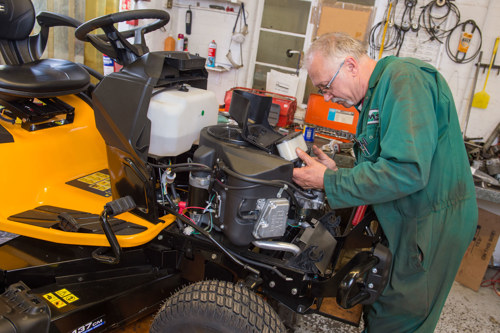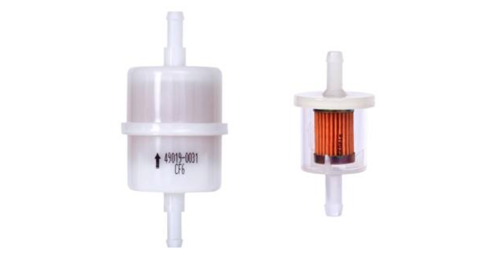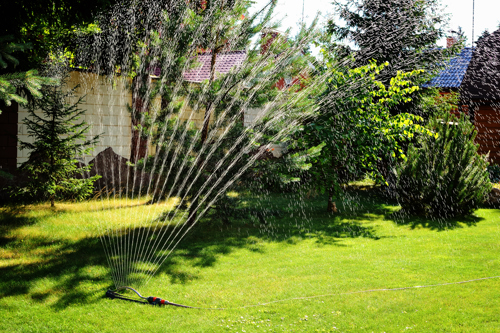Have you fallen for any of these landscape maintenance myths?
17 Nov 2023 Landscaping & Turfcare
From lawn care techniques all the way to engine maintenance, myths and hearsay are surprisingly rife in the landscaping industry.
While most professionals know better than to fall for common garden myths, there may be one or two that surprise you. Join us as we set to mythbusting the half-truths or misconceptions plaguing the landscaping industry – and don't be afraid to own up to the myths you fell for!
Are you familiar with these engine-related myths and half-truths?
We'll start with mythbusting the rumours and false beliefs surrounding 2-stroke and 4-stroke engines. After all, there's nothing we know better! Let us unveil the reality behind these myths and misunderstandings, so that you can look after your engine properly and maximise performance.
Even if you know the truth behind many of these already, you may learn a thing or two about why they're false regardless.
It doesn't matter which fuel you use
Landscaping professionals will know this, but it's a surprisingly common misconception that any fuel will do for a lawn mower. It’s always advisable to know the fuel type recommended by the manufacturer as certain blends and additives may cause damage to your engine and could void your warranty.
You should use regular E10 fuel in your Kawasaki engine, and be careful not to accidentally mix the 2-stroke and 4-stroke supply – it’s easy to do so when you’re tired. The fuel you use for 2-stroke and 4-stroke is of course the same, except that oil is added into a 2-stroke mix to act as lubricant.
An engine is an engine – all engines are the same.
Internal combustion engines have been around for some time, and the basic design has changed very little since its invention in the 19th century. But while engines will work in the same way, they are not the same.
From the choice of materials and components to manufacturing processes and quality control, it’s the finer details that make the difference. What makes Kawasaki engines so reliable is that we pay careful attention to all these aspects, designing and manufacturing our engines to handle the rigours of commercial scale workloads.
A Kawasaki engine is built to last, and we achieve this by committing to quality – in materials, innovation, people and processes – and helping our dealers and customers to access the correct information to maximise engine life.
Using premium fuel improves performance
Using premium fuel in a lawn mower engine designed for regular unleaded is not going to give you an advantage. In fact it’s likely to disadvantage you financially as it’s more expensive. Despite what some may think, premium fuel will not improve performance or fuel efficiency in an engine that doesn’t require it.
Maintenance can be done at home

Some minor maintenance can and should be done at home. But even if you’re really proficient in your own workshop, there are some tasks that should always be completed by a competent technician at an Authorised Dealer.
The level of technical competency required to complete tasks like re-gaping spark plugs, cleaning the combustion chamber, adjusting valve clearances and a full engine strip down is high, and it’s easy to make a mistake that can damage your engine. It’s the safer choice to reserve these tasks for those with the expertise and experience, so you can guarantee your engine is performing at its best.
Filters only need replacing when there's a problem
Filters do the hard work when it comes to clearing out debris and protecting your engine. Over time, they become vulnerable to getting clogged or contaminated, which reduces their efficiency. This can allow debris into the engine, causing damage and reducing its efficiency.
Filters should be changed at regular intervals according to the advice in your owner's manual. Performing a simple visual inspection of your air filters every day and cleaning any visible build up like grass clippings will significantly improve engine performance.
A fuel stabiliser will take care of my machine over winter
If you're using fuel stabilisers, you should be aware that they can affect engine performance, leading to issues like poor starting, rough running, smoking, misfiring, and poor fuel economy.
Ethanol is now added to fuel to reduce carbon dioxide emissions but can lead to corrosion if subject to prolonged inactivity. You may have left fuel in your machine over winter in the past, but what was acceptable in older engines is no longer the case – the materials that created this resistance are now known to be hazardous. The best practice is to focus on a full fuel drainage for safe winter storage.
Running the mower until it's out of fuel is bad for the engine
While we wouldn't recommend doing this regularly (to avoid causing sediment and residue build-up), periodically draining your engine completely of fuel is a good thing, as it guarantees that fresh fuel is being used.
It's particularly important to drain fuel before long-term storage, and operating the engine until it depletes its fuel supply is an effective way to guarantee no residual fuel is left in the pipes and carburettor. Our recommendation for this is to run the engine after draining the tank until it naturally shuts down and comes to a stop.
An oil change isn’t really necessary if my machine works okay
Some people believe that lawnmower engines don't require oil changes – or at least that they can wait until there’s an issue.
The truth behind this misconception is that oil deteriorates over time, and its lubrication properties begin to diminish. Old oil can cause carbon build up in the engine, and lead to components wearing prematurely or failing. We recommend an oil and filter change annually, at least, or sooner depending on hours of use, in line with the service schedule.
Aftermarket, non-genuine parts are just as good

The belief that non-genuine parts are as good as genuine parts produced by a manufacturer can lead to engine damage and worsening performance.
At Kawasaki Engines, our Genuine Parts are made specifically for our engines, and designed to maximise performance and increase durability. With aftermarket, non-genuine parts you leave an element to chance – they are not made to the same specification or subjected to the same rigorous testing. Their typically inferior quality can allow debris into the engine, causing damage, lowering its performance level and shortening the engine’s lifespan.
The warranty on my machine includes the engine
You may be aware that your machine has a warranty, but did you know that the engine has its own separate warranty? Many people are unaware that their Kawasaki engine is covered by a warranty unrelated to that of the machine.
It’s important for us to demonstrate the faith we have in our engine reliability in a way customers can trust. All of our 2-stroke engines are covered for two years, with unlimited hours of use. For 4-stroke engines, this is three years, with unlimited hours of use. Kawasaki Genuine Parts also have a warranty period of six months.

Have you heard of any of these lawn care myths?
Now that we’ve dispelled the myths and half-truths surrounding engines, it’s time to take a look at a handful of the lawn care and garden myths that tend to circulate.
These are all things a landscape professional is sure to know already, but sometimes it’s good to remind ourselves what our customers may be thinking, and advise accordingly!
You should water your grass in the evening
This one often comes around in the summer, when concerns about scorching the grass start to become relevant.
Many of your customers may start to water their grass in the evening, fearing that they will damage their lawn if they do so earlier in the day. This can lead to the development of fungal growth and lawn diseases, ultimately harming the lawn despite their best efforts. Advise your customers to water early in the morning so the water isn’t left sitting on the grass overnight.
You should water your lawn every day to keep it green

In a similar vein, customers may believe that they need to water their lawns every single day in summer. But the reality is that it's better to water deeply and infrequently to encourage deep root growth, which makes the lawn more drought tolerant. Helping your customers to understand this will make your job a lot easier!
Cutting the grass short is best
Most – and likely all – landscapers will be familiar with scalping. Some customers may argue for a shorter cut (perhaps in the hope of making them more infrequent), but you should explain to them why this is not the best way forward.
Scalping the lawn exposes roots to the sun, making them vulnerable to drought and creating brown spots. In addition to weakening the grass, it also encourages weeds to grow. Help them understand that it’s better to have their grass a little too long, rather than too short for the health of the lawn.
Keeping their grass at a suitable height will provide shade to the roots and keep more nutrients in the grass itself, which helps encourage growth and promotes lawn health.
Regularly pruning trees and shrubs makes them grow quicker
Excessive pruning can stress trees and lead to slower growth. Prune as needed for health and shape, but avoid excessive cutting.
You should also remind customers that pruning is not all year round. For floral shrubbery, for example, the best time to prune is after flowering. If the plant needs to be severely reduced, this can be done in late winter or early spring before any new growth begins.
Chemical treatments are always necessary
Suggesting sustainable alternatives to customers can help your business become a little more environmentally friendly. Chemical treatments are not always the best solution for disease control, despite popular belief, and simply keeping to best lawn care practices is often enough to treat them.
How did you do?
Did you know all of the myths we listed here? Hopefully you’ve learned a thing or two about Kawasaki engines and the best way to approach maintenance along the way! Understanding what your customers may be thinking is almost as important as your own knowledge base – advising against these practices can make your life easier long-term.
One thing that is certainly not a myth is the reputation Kawasaki engines have for high performance and reliability. Our engines are designed for professional use, and are the perfect companion for long days of hard work.
Explore the range of machinery Powered by Kawasaki to find your own workhorse today.






